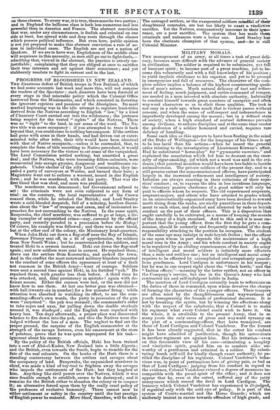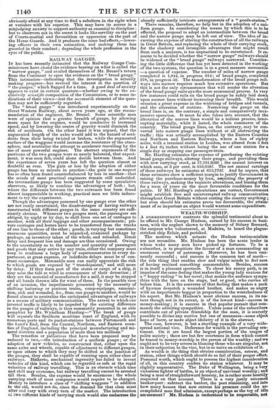MILITARY MORALS.
THE management of an army, at all times a task of great deli- cacy, becomes more difficult with the advance of general society in civilization. The soldier is required to be submissive, yet full of buoyant spirit ; to become part of a great machine, yet to be- come this voluntarily and with a full knowledge of his position; to yield implicit obedience to his superior, and yet to be prompt in emergencies and full of resources. The character of the com- plete soldier implies a balance of the highest counteracting quali- ties of man's nature. Much natural delicacy of tact and refine- ment of feeling, much judgment, and entire command of temper, are needed in a man invested with absolute authority, habitually to conduct himself towards great numbers of energetic and often wayward characters so as to elicit these qualities. The task is not easy in a rude age, when much that is violent passes without censure, and when the sense of self-respect and independence is imperfectly developed amonc, the masses ; but in a refined state of society, when a high standard of mutual deference prevails among civilians, to enforce discipline and at the same time render the profession of a soldier honoured and envied, requires rare delicacy of handling. Some such idea as this appears to have been floating in the mind of the Duke of Wellington—for the language of his Grace is apt to be less lucid than his actions—when he issued the general order relating to the investigation of Lieutenant Kirwan's affair. Had he substituted "horse-play" for "gymnastic exercises," and explained the association which led him to descant on the enor- mity of cigar-smoking, (of which not a word was said in the evi- dence,) that paternal monition would have been less liable to hostile animadversion. The private soldiers of the present day, and to a still greater extent the noncommissioned officers, have participated largely in the increased refinement and intelligence of society. Inferiors are always exacting in their criticisms of their supe- riors' conduct ; or, to express the idea in less invidious language, the voluntary passive obedience of a good soldier will only be paid to officers whom he respects. The old experienced sergeants, sergeant-majors, and others who have attained to grades which in an aristocratically-organized army have been devised to reward merit rising from the ranks, are nicely punctilious in their deport- ment to each other, and shocked and alienated by rude or boyish conduct on the part of their officers. This is a disposition that ought carefully to be cultivated, as a means of keeping the morale of the Army at a high standard. And to this end it is most im- portant that the young officer, from the first day he gets a com- mission, should be earnestly and frequently reminded of the deep responsibility attaching to the position he occupies. The student of the same age may indulge in rude boyish frolics ; but the officer is one upon whom in part depends the maintenance of a high moral tone in the Army ; and his whole conduct in society ought to be regulated by an abiding consciousness of the fact. An army of intelligent and moral soldiers is infinitely more effective than a rude and reckless one ; but an intelligent and moral army requires to be officered by accomplished and scrupulously puncti- lious gentlemen. Lord Cardigan is unfortunate in his temper ; but he was in one respect right about the "black bottle," and the "Indian officer,"—meaning by the latter epithet, not an officer in the Company's service but one in the Queen's Army who had contracted lax and sell-indulgent habits in India. The mention of Lord Cardigan naturally leads to reflections on the duties of those in command, upon whom devolves the charge of forming the characters of the younger officers. Their tempers are often tried by the thoughtlessness and waywardness of youth transgressing the bounds of professional decorum. It is not by breaking the spirits, but by winning the affections along with the respect of the subalterns, that a Colonel is to make his regiment what every Colonel could wish to have it. On the whole, it is creditable to the present Army, that in so many years the only cases of gross and wayward tyranny on the part of a commanding-officer' that have transpired, are those of Lord Cardigan and Colonel Vandeleur. For the former it has been already suggested, that in the outset his conduct might have admitted of justification, though his antecedents in another regiment are against him. But his irritation—even on this favourable view of his case—stimulating a haughty and vindictive spirit, goaded him on to conduct alike un- worthy of a gentleman and criminal in a soldier. By substi- tuting harsh self-will for kindly though exact authority, he pe- rifled the discipline of his regiment. Colonel Vandeleur's beha- viour was, in point of pertinacious love of giving pain, as bad as that of Lord Cardigan : judging from his conduct in regard to the evidence, Colonel Vandeleur evinced a degree of meanness in- compatible with the proud spirit of the other ; and it does not appear that he even at the outset, suffered any of the petty annoyances which roused the devil in Lord Cardigan. The leniency- which Colonel Vandeleur has experienced is ill-judged, if regarded only with the cold eye of policy. It is part of the system of Courts,martial and the Horse Guards ; which are uniformly lenient in excess towards offenders of high grade, and
obviously afraid at any time to find a subaltern in the right when at variance with his superior. This may have its source in a misjudging anxiety to support authority as essential to discipline : but to observers not in the secret it looks like servility on the part of Courts-martial and favouritism or oppression on the part of the Home Guards. And it produces the same bad effects,—lower- ing officers in their own estimation and making them less guarded in their conduct ; degrading the whole profession in the eyes of the public.



























 Previous page
Previous page